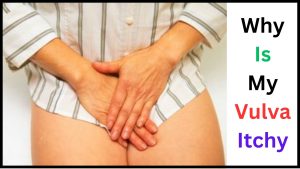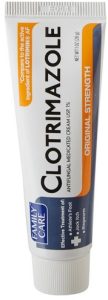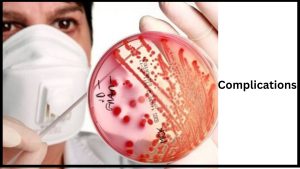 Why Is My Vulva Itchy – Are you experiencing discomfort down there? Don’t worry, you’re not alone.
Why Is My Vulva Itchy – Are you experiencing discomfort down there? Don’t worry, you’re not alone.
Many women have wondered, “Why does my vulva itch?”
It’s a common concern and can be caused by a range of factors, such as infections, irritants, or hormonal changes.
In this article, we’ll shed some light on the possible causes of vulvar itching and discuss effective remedies to bring you relief.
So, if you’re tired of scratching your head, let’s explore the reasons behind that itch and find a solution that works for you!
Table of Contents
Why Is My Vulva Itchy: Causes, Symptoms, Prevention, & Treatment
Causes of Vulva Itching
Vulva itching can be caused by various factors, including skin conditions, infections, hormonal changes, poor hygiene, irritants, and allergens.
Skin conditions
Skin conditions such as eczema, psoriasis, and lichen sclerosus can cause itching in the vulva area.
These conditions can result in dry, red, and inflamed skin, leading to persistent itching.
Infections
Infections, particularly yeast infections like thrush or bacterial vaginosis, are common culprits of vulva itching.
These infections can cause an imbalance in the vaginal flora, leading to itching, burning, and unusual discharge.
Hormonal changes
Hormonal changes, such as those that occur during menstruation, pregnancy, or menopause, can also contribute to vulva itching.
Fluctuations in estrogen levels can affect the moisture and pH balance of the vulva, making it more susceptible to itching and discomfort.
Poor hygiene
Insufficient or improper hygiene practices can lead to vulva itching.
Failing to wash the vulva regularly or using harsh soaps and fragrances can disrupt the natural balance of the vaginal flora and irritate the delicate skin.
Irritants and allergens
Exposure to certain irritants and allergens can trigger itching in the vulva area.
These can include perfumed hygiene products, laundry detergents, synthetic fabrics, and even certain foods.
Allergic reactions or sensitivities to these substances can cause itching and irritation.

Symptoms and Diagnosis
Understanding the symptoms and seeking a professional diagnosis is essential in addressing vulva itching.
Common symptoms
Common symptoms of vulva itching may include itching, redness, swelling, soreness, a burning sensation, and changes in discharge.
It is important to take note of any other accompanying symptoms, as they can provide additional clues for diagnosis.
Professional Diagnosis
If you are experiencing persistent or severe vulva itching, it is advisable to seek a professional diagnosis from a healthcare provider.
They will conduct a physical examination, review your medical history, and may recommend tests such as vaginal swabs or blood work to determine the underlying cause of the itching.
Prevention and Treatment
Prevention and proper treatment are crucial in managing vulva itching.
Maintaining good hygiene
To prevent vulva itching, it is important to maintain good hygiene practices.
This includes washing the vulva with warm water and mild, fragrance-free soap, avoiding douching, and wiping from front to back after using the toilet. 
Choosing the right underwear
Choosing breathable, cotton underwear can help prevent vulva itching.
Synthetic fabrics can trap moisture and heat, creating an environment conducive to itching and irritation. Avoid tight-fitting underwear to allow proper airflow.
Avoiding irritants
Identify and avoid irritants that may trigger vulva itching.
This includes avoiding scented hygiene products, laundry detergents, and fabric softeners that may contain harsh chemicals.
Opt for gentle, fragrance-free alternatives instead. 
Antifungal or steroid creams
For mild cases of vulva itching caused by infections or skin conditions, over-the-counter antifungal or steroid creams may provide relief.
These creams help to reduce inflammation, itching, and discomfort.
Medical interventions
In more severe or persistent cases, a healthcare provider may prescribe stronger medications or recommend further medical interventions.
This may include oral antifungal medications, topical estrogen creams for hormonal imbalance, or specific treatments for underlying conditions.

Caring for an Itchy Vulva
When faced with an itchy vulva, several self-care measures can help alleviate discomfort.
Avoid scratching
Although it can be tempting, scratching the itchy vulva can worsen the irritation and potentially lead to skin damage or infections.
Instead, try to resist the urge to scratch and find alternative ways to relieve the itchiness.
Wear loose clothing
Wearing loose-fitting clothing can help promote airflow and reduce moisture in the vulva area, thus alleviating itching.
Opt for breathable fabrics like cotton and avoid tight pants or underwear that can create friction and irritation.
Use fragrance-free products
Choosing fragrance-free hygiene products, including soaps, toilet paper, and laundry detergents, can help minimize irritation.
Fragrances can contain chemicals that may trigger or worsen vulva itching.
Apply cool compresses
Applying cool compresses to the itchy vulva can provide temporary relief.
A clean cloth soaked in cool water can be gently applied to the area, helping to soothe inflammation and reduce itching.
Avoid sexual intercourse temporarily
If vulva itching is caused by an infection or inflammation, it is advisable to avoid sexual intercourse until the symptoms have resolved.
Sexual activity can exacerbate the itching and potentially spread the infection.

When to Seek Medical Help
While most cases of vulva itching can be managed with self-care measures, there are situations where medical help should be sought.
Persistent itching
If the vulva itching persists despite self-care measures or worsens over time, it is important to seek medical attention.
This may indicate an underlying condition that requires appropriate diagnosis and treatment.
Other symptoms
If the vulva itching is accompanied by other symptoms such as abnormal discharge, foul odor, pain during urination, or pelvic pain, it is essential to consult a healthcare provider.
These additional symptoms may suggest a more serious infection or condition that needs medical attention.
Pregnancy
Pregnant women experiencing vulva itching should consult their healthcare provider.
Itching in pregnancy can sometimes be a sign of a condition called intrahepatic cholestasis of pregnancy, which requires medical monitoring and management.
Children
If a child is experiencing vulva itching, it is advisable to consult a pediatrician or healthcare provider experienced in treating pediatric gynecological issues.
Children may require specialized care and treatment.
Menopause
Menopausal women who experience vulva itching should consult their healthcare provider, as hormonal changes during menopause can contribute to vaginal dryness and itching.
Hormone replacement therapy or other treatments may be recommended.

Complications
Ignoring or improperly managing vulva itching can result in potential complications.
Secondary infections
Persistent scratching or improper treatment of vulva itching can lead to secondary infections.
Bacteria introduced through scratching can cause infections, which may require additional medical interventions to resolve.
Scarring or skin changes
Chronic vulva itching can cause scarring or changes in the skin texture and color.
This can lead to long-term discomfort and may require specialized treatment to address.
Psychological distress
Constant vulva itching can cause psychological distress, leading to anxiety, frustration, and poor quality of life.
Seeking appropriate treatment and support can help alleviate these psychological effects.
Common Misconceptions
There are certain common misconceptions surrounding vulva itching that need clarification.
Only women get vulva itching
While vulva itching is more common in women due to differences in anatomy and hormonal factors, men can also experience itching in the genital area.
Itching in the male genitalia may be caused by similar factors such as skin conditions, infections, or irritants.
It’s always a sign of an STD
Vulva itching is not always a sign of a sexually transmitted disease (STD).
While some STDs can cause itching, numerous other non-sexually transmitted causes can lead to vulva itching.
It is important to consider all possible causes and seek a proper diagnosis from a healthcare professional.
Conclusion
Understanding the causes of vulva itching and taking proper preventive measures is essential for maintaining vulva health.
By maintaining good hygiene, making informed choices about underwear and products, and seeking medical help when necessary, individuals can effectively manage vulva itching and ensure their overall well-being.
If vulva itching persists or is accompanied by other concerning symptoms, it is crucial to consult a healthcare provider for appropriate diagnosis and treatment.
